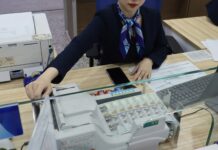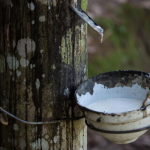On August 6, 2024, the Department of Agriculture and Rural Development of Lao Cai province, in collaboration with SUTECH Science and Technology Consulting Company Limited, organized a workshop to guide businesses, cooperatives, and exporters on registering to export plant-based food products to China.
CHANGING TRADE RELATIONS WITH CHINA
In his opening remarks, Mr. Nguyen Quang Vinh, Deputy Director of the Department of Agriculture and Rural Development of Lao Cai province, stated that Lao Cai shares a 200-kilometer border with China and has three pairs of international border gates: Lao Cai, Muong Khuong, and Bat Sat.
Mr. Vinh noted that the province’s import and export activities in the first six months of 2024 showed positive signs, with the value of import and export, buying and selling, and goods exchange through the border gates estimated at 1.6 billion USD, a 64.2% increase compared to the same period in 2023. The export value reached 950 million USD, a growth of 104.2% compared to the previous year.
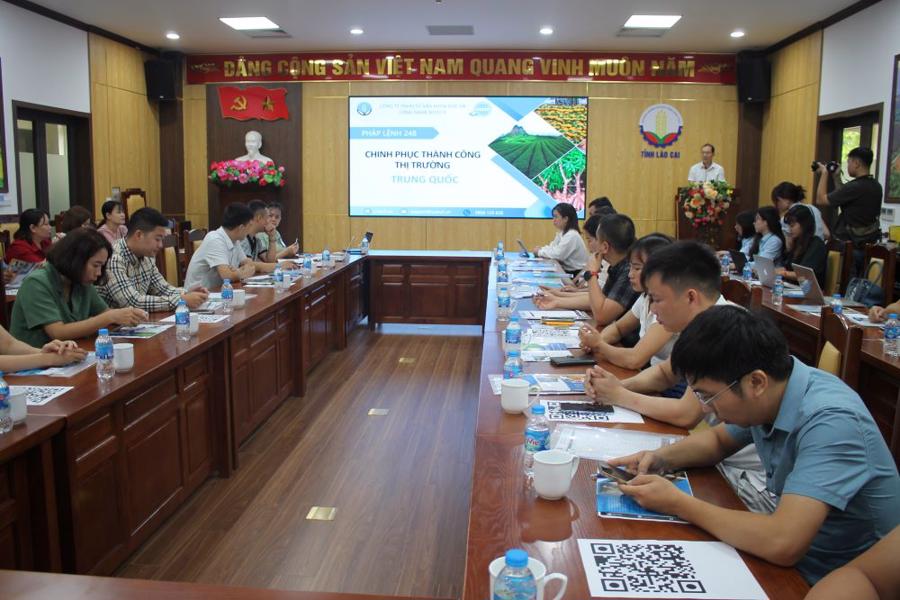
Several agricultural products achieved high export values, including durian, with exports through Lao Cai surging to over 520 million USD, averaging about 70-100 trucks of goods per day; dragon fruit reaching over 60 million USD; and bananas, jackfruit, mangoes, lychees, watermelons, and other fruits also being exported in significant quantities, contributing to the diversification of products and enhancing the export value of agricultural produce.
Lao Cai’s key exports include fertilizers and chemicals associated with the mineral processing zone. In terms of agriculture, the province’s diverse climate allows for a range of competitive crops, with a focus on developing “5 plants and 1 animal”: cinnamon, tea, bananas, pineapples, medicinal plants, and pigs. Cinnamon, in particular, covers over 60,000 hectares, mainly for export, with nearly 100% of the province’s cinnamon oil being exported to China.
“Plant-based products for export to China must have a growing area code. Moreover, China demands higher quality, better environmental hygiene, and harvesting procedures that ensure food safety. This poses a challenge for cooperatives and farmers in Lao Cai province,” said Mr. Vinh, highlighting the reality faced by local producers.
“In the past, China did not have border barriers, and the requirements for imported goods were not as stringent. Exports were mainly through unofficial channels. From 2021 onwards, China has completed the construction of border barriers, so unofficial trade is no longer possible.”
Mr. Nguyen Quang Vinh, Deputy Director, Department of Agriculture and Rural Development, Lao Cai Province.
To facilitate the export of agricultural products to meet the requirements of importing countries, the Lao Cai authorities have regularly reviewed, inspected, and guided businesses. At the same time, cooperatives have been working to meet the necessary standards and have sent documents requesting the Plant Protection Department (under the Ministry of Agriculture and Rural Development) to grant growing area codes and packaging facility codes for agricultural produce.
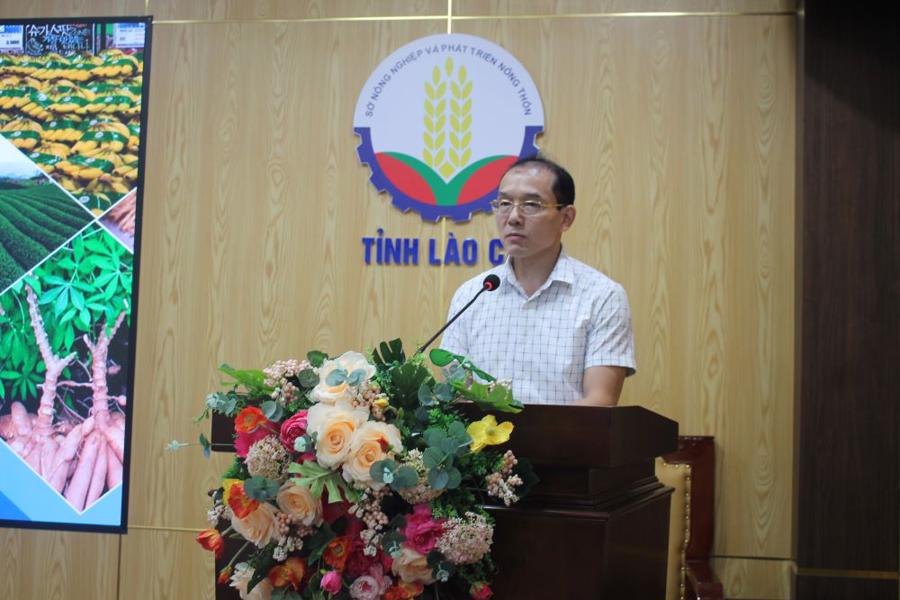
According to Ms. Cao Thi Hoa Binh, Head of the Plant Protection and Cultivation Division of Lao Cai province, in 2023, Lao Cai had 16 growing areas that met the standards for export, including 15 banana-growing areas for export to China and one tea-growing area for export to Europe, the United States, Taiwan, and Japan.
Based on monitoring and inspections, the Department of Agriculture and Rural Development has requested the revocation of codes from three growing areas that failed to meet the prescribed standards for export. Currently, Lao Cai maintains 13 growing areas for export.
Regarding packaging facilities, in 2023, Lao Cai had 11 packaging facilities for agricultural exports to China, including eight for bananas, two for black jelly, and one for passion fruit. Following inspections, the Department of Agriculture and Rural Development has requested the revocation of codes from four facilities that did not meet export requirements (three banana packaging facilities and one black jelly packaging facility). At present, seven packaging facilities with assigned codes are operating in the province.
CHALLENGES IN IMPLEMENTING CHINA’S DECREE 248
Ms. Binh pointed out several challenges in assigning and managing growing area codes and packaging facility codes. She noted that the standards set by importing countries (particularly China) for agricultural products are becoming increasingly stringent and subject to frequent changes, creating difficulties for local authorities and exporting businesses in keeping up with the latest information and compliance requirements.
The assignment of growing area codes is a new process, and there are limitations in the understanding of some stakeholders. Managing these codes is also challenging due to a lack of funds for equipment and technology to support regular monitoring and supervision, especially in the complex mountainous terrain of Lao Cai, which makes it difficult to access certain areas for inspections and outreach.
“In the Chinese Customs system, there is no concept of ‘organic’, and there are no standards for organic products. Some Vietnamese agricultural products may have organic certification issued by competent authorities or even prestigious European organizations, but if they do not have a growing area code granted by China, they cannot be exported to China.”
Ms. Phan Thi Men, General Director, SUTECH Science and Technology Consulting Company Limited.
Notably, some of Lao Cai’s key industries, such as pineapple and medicinal plants, are not yet included in the protocols and Decree 248 and 249. Regarding the cinnamon industry, which has a large production area, there is a lack of control over growing areas (due to the absence of specific guidelines on assigning growing area codes for cinnamon), so requests for codes for this crop cannot be fulfilled at this time.
Ms. Phan Thi Men, General Director of SUTECH Science and Technology Consulting Company Limited, shared that China’s Decree 248, which took effect on January 1, 2022, stipulates that all foreign companies producing food for export to China must register with the country’s Customs authority. Since the decree came into force, several agricultural products have been the subject of separate decrees signed by the Vietnamese Ministry of Agriculture and Rural Development.
However, according to Ms. Men, after two years of implementation, many businesses are still confused and struggling to meet the requirements and register export codes for agricultural products to China as stipulated in the decree.
According to statistics from the state management agency, Vietnam has registered over 3,000 export codes for the Chinese market. The responsibility for assigning these codes is divided among different agencies: the Plant Protection Department for products of plant origin, the Animal Health Department for products of animal origin, the Department of Quality Management of Agricultural, Forestry, and Fisheries Products for products of aquatic origin, the Ministry of Health for functional food products, and the Science and Technology Department under the Ministry of Industry and Trade for deeply processed products.
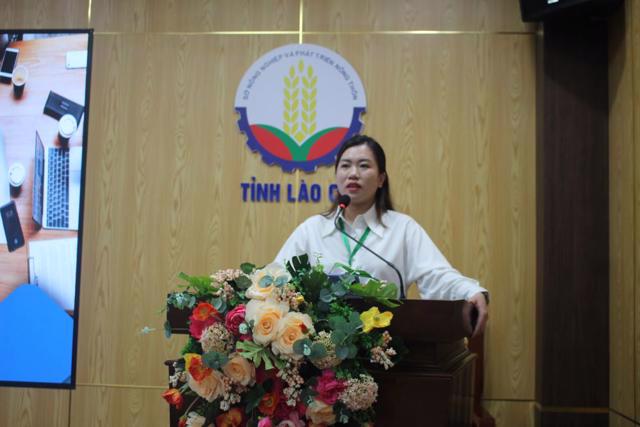
As a company specializing in consulting for agricultural exports to China, the United States, and India, SUTECH Science and Technology Consulting Company Limited has successfully guided numerous entities in the industry to export their products to the Chinese market.
At the workshop, Ms. Men also answered inquiries from businesses and cooperatives from Lao Cai, Yen Bai, and Phu Tho provinces regarding challenges in exporting agricultural products to China and the procedures for obtaining growing area codes and packaging facility codes.
Chinese citizens flock to buy 280 tons of gold, realizing real estate and stocks are no longer a good investment channel
Regardless of the global decline in demand for gold, the purchasing power of Chinese citizens has propelled the price of gold to surpass the $2,000 per ounce threshold in 2023.










